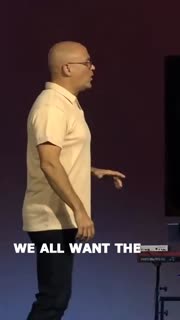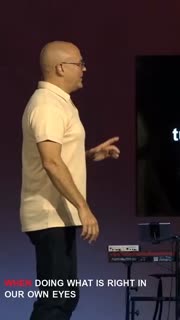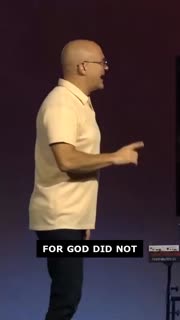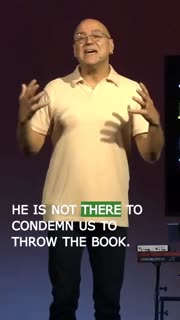Restoring Moral Authority in a Chaotic World
Summary
### Summary
Good morning, everyone. Today, we embark on a new series focusing on one of the most graphic and violent stories in the Bible, found in the book of Judges. This period in Israel's history, between their settlement in the Promised Land and the establishment of their first king, King Saul, is marked by a cycle of disobedience, disaster, and deliverance. The book of Judges serves as a mirror for us, reflecting our own moral decline and the consequences of living without a centralized moral authority.
The Israelites, having moved from a theocracy to a theocratic commonwealth, lost their moral consensus over time. This led to political division, economic disparity, and social injustice, much like what we see in our society today. The story we delve into is particularly horrific, involving a Levite and his concubine, and it highlights the extreme moral decay of the time. The Levite's concubine is brutally abused and killed, leading to a series of violent retaliations among the tribes of Israel.
This story is not just about the sexual immorality and violence; it’s about the loss of moral authority and the consequences of everyone doing what is right in their own eyes. The Israelites justified their actions, no matter how horrific, because they had no ultimate moral authority to guide them. This lack of moral consensus led to a cycle of violence and retribution, culminating in near-genocide among the tribes.
The key takeaway is that without a central moral authority, society descends into chaos. We see this in our own world today, where political, economic, and social divisions are rampant. The story of Judges calls us to reflect on who the ultimate moral authority in our lives is. Is it God, or is it our own emotions and appetites? True justice and moral consensus can only be achieved when we align ourselves with God's authority.
### Key Takeaways
1. The Cycle of Disobedience and Deliverance: The book of Judges illustrates a repetitive cycle of disobedience, disaster, and deliverance. This cycle is a reflection of our own lives when we stray from God's moral authority. Disobedience leads to disaster, but God always provides a way for deliverance if we turn back to Him. [04:41]
2. Loss of Moral Consensus: When a society loses its moral consensus, it descends into chaos. The Israelites, once united under God's law, began to justify their actions based on their own understanding, leading to political division, economic disparity, and social injustice. This mirrors our current societal issues and calls us to return to a unified moral standard under God. [09:18]
3. The Danger of Justifying Wrong Actions: Everyone in the story of Judges justified their horrific actions because they had no central moral authority. This serves as a warning to us: when we justify our wrong actions based on our emotions and appetites, we stray further from God's will and invite disaster into our lives. [35:55]
4. The Role of Judges and Jesus: God raised up judges to save the Israelites, not to condemn them. Similarly, Jesus came not to condemn the world but to save it. He is the ultimate judge who calls us back into a right relationship with God, offering us a way out of our self-inflicted disasters. [48:27]
5. The Need for a Central Moral Authority: True justice and moral consensus can only be achieved when we align ourselves with God's authority. Without this, we are left to our own flawed reasoning and emotions, which lead to chaos and destruction. We must commit to making God the ultimate moral authority in our lives. [51:05]
### YouTube Chapters
[0:00] - Welcome
[02:11] - Introduction to the Book of Judges
[03:29] - Israel's Transition and Moral Decline
[04:41] - The Cycle of Disobedience and Deliverance
[05:55] - The Role of Judges
[07:04] - Historical Context and Timeline
[09:18] - Loss of Moral Consensus
[10:34] - Generational Disconnect
[12:48] - Political and Social Division
[15:32] - The Levite and His Concubine
[19:08] - Cultural Practices and Exploitation
[23:10] - The Gibeon Mob and Hospitality
[25:38] - The Outrageous Solution
[30:12] - Israel's Genocidal Revenge
[35:55] - Everyone Did What Was Right in Their Own Eyes
[48:27] - God Raised Up Judges
[51:05] - The Need for a Central Moral Authority
[55:09] - Prayer and Commitment
Study Guide
### Bible Study Discussion Guide
#### Bible Reading
1. Judges 2:10-11 (NIV) - "After that whole generation had been gathered to their ancestors, another generation grew up who knew neither the Lord nor what he had done for Israel. Then the Israelites did evil in the eyes of the Lord and served the Baals."
2. Judges 21:25 (NIV) - "In those days Israel had no king; everyone did as they saw fit."
3. Exodus 23:9 (NIV) - "Do not oppress a foreigner; you yourselves know how it feels to be foreigners, because you were foreigners in Egypt."
#### Observation Questions
1. What was the cycle of behavior that the Israelites repeatedly fell into during the period of the Judges? [04:41]
2. How did the lack of a central moral authority affect the Israelites' society and their actions? [09:18]
3. What was the Levite's response when he found his concubine at the door the next morning? [27:12]
4. How did the Israelites react to the horrific events involving the Levite's concubine and the subsequent actions of the Benjamites? [28:43]
#### Interpretation Questions
1. What does the cycle of disobedience, disaster, and deliverance in Judges reveal about human nature and our relationship with God? [04:41]
2. How does the story of the Levite and his concubine illustrate the dangers of justifying wrong actions based on personal reasoning? [35:55]
3. In what ways does the lack of a central moral authority lead to chaos and moral decay, both in the time of the Judges and in our society today? [09:18]
4. How does the role of the Judges in the Old Testament compare to the role of Jesus as described in the sermon? [48:27]
#### Application Questions
1. Reflect on a time when you justified a wrong action based on your emotions or appetites. How did that decision impact your life and the lives of others? [35:55]
2. The sermon mentioned that true justice and moral consensus can only be achieved when we align ourselves with God's authority. What steps can you take to ensure that God is the ultimate moral authority in your life? [51:05]
3. How can you actively work to restore moral consensus within your community or family, especially in areas where there is significant division or disagreement? [09:18]
4. The Israelites experienced a generational disconnect that led to a loss of moral consensus. How can you ensure that the next generation in your family or community knows and understands God's works and moral standards? [10:34]
5. The sermon highlighted the importance of not justifying wrong actions. How can you hold yourself accountable to God's standards, even when it is difficult or counter-cultural? [35:55]
6. In what ways can you demonstrate the role of Jesus as a savior and not a condemner in your interactions with others, especially those who may have strayed from God's path? [48:27]
7. How can you cultivate a habit of seeking God's will and guidance in your daily decisions, rather than relying on your own understanding or societal norms? [54:04]
Devotional
Day 1: The Cycle of Disobedience and Deliverance
Description: The book of Judges illustrates a repetitive cycle of disobedience, disaster, and deliverance. This cycle is a reflection of our own lives when we stray from God's moral authority. Disobedience leads to disaster, but God always provides a way for deliverance if we turn back to Him. The Israelites repeatedly turned away from God, faced dire consequences, and then cried out for deliverance. God, in His mercy, raised up judges to rescue them. This pattern serves as a reminder that no matter how far we stray, God is always ready to deliver us if we repent and return to Him. [04:41]
Judges 2:18-19 (ESV): "Whenever the Lord raised up judges for them, the Lord was with the judge, and he saved them from the hand of their enemies all the days of the judge. For the Lord was moved to pity by their groaning because of those who afflicted and oppressed them. But whenever the judge died, they turned back and were more corrupt than their fathers, going after other gods, serving them and bowing down to them. They did not drop any of their practices or their stubborn ways."
Reflection: Think of a time when you faced a difficult situation due to straying from God's path. How did you experience God's deliverance when you turned back to Him? How can you apply this lesson to a current struggle?
Day 2: Loss of Moral Consensus
Description: When a society loses its moral consensus, it descends into chaos. The Israelites, once united under God's law, began to justify their actions based on their own understanding, leading to political division, economic disparity, and social injustice. This mirrors our current societal issues and calls us to return to a unified moral standard under God. The story of Judges shows that without a central moral authority, people do what is right in their own eyes, leading to societal breakdown. [09:18]
Judges 21:25 (ESV): "In those days there was no king in Israel. Everyone did what was right in his own eyes."
Reflection: Reflect on an area in your community where you see a lack of moral consensus leading to division or injustice. How can you be a catalyst for change by upholding God's moral standards?
Day 3: The Danger of Justifying Wrong Actions
Description: Everyone in the story of Judges justified their horrific actions because they had no central moral authority. This serves as a warning to us: when we justify our wrong actions based on our emotions and appetites, we stray further from God's will and invite disaster into our lives. The Israelites' actions, driven by personal justification, led to a cycle of violence and retribution. This highlights the importance of aligning our actions with God's will rather than our flawed reasoning. [35:55]
Proverbs 21:2 (ESV): "Every way of a man is right in his own eyes, but the Lord weighs the heart."
Reflection: Identify a recent decision you made based on your emotions or desires rather than seeking God's guidance. How can you realign your decision-making process to reflect God's will?
Day 4: The Role of Judges and Jesus
Description: God raised up judges to save the Israelites, not to condemn them. Similarly, Jesus came not to condemn the world but to save it. He is the ultimate judge who calls us back into a right relationship with God, offering us a way out of our self-inflicted disasters. The judges in the Old Testament were a foreshadowing of Jesus, who provides ultimate deliverance and reconciliation with God. [48:27]
John 3:17 (ESV): "For God did not send his Son into the world to condemn the world, but in order that the world might be saved through him."
Reflection: How does understanding Jesus as the ultimate judge and savior change your perspective on your own failures and need for deliverance? How can you embrace His offer of salvation today?
Day 5: The Need for a Central Moral Authority
Description: True justice and moral consensus can only be achieved when we align ourselves with God's authority. Without this, we are left to our own flawed reasoning and emotions, which lead to chaos and destruction. We must commit to making God the ultimate moral authority in our lives. The story of Judges demonstrates the consequences of living without a central moral authority and calls us to submit to God's guidance for true justice and peace. [51:05]
Isaiah 33:22 (ESV): "For the Lord is our judge; the Lord is our lawgiver; the Lord is our king; he will save us."
Reflection: In what areas of your life are you relying on your own understanding rather than seeking God's authority? What steps can you take today to submit these areas to God's guidance?
Quotes
### Quotes for Outreach
1. "We all want the freedom to do what we want, when we want, with whom we want. And nobody can tell us it's wrong. Now, of course, we're civilized Americans. We're Christianized Americans. So we add the little caveat. As long as nobody, gets hurt, right? But anybody here above a fifth grade education knows somebody eventually gets hurt. Don't they?" [43:19] (26 seconds)
2. "When doing what is right in our own eyes turns out horribly wrong, we want somebody with authority to bail us out. We want somebody with some authority to bail us out. We want somebody in authority whose authority we rejected to bail us out." [46:04] (21 seconds)
3. "Some of you are here today watching online. You showed up for this very reason. You are hoping that God will help you out. The same God that you wanted to stay out of your decisions. And let me tell you what's so awesome about God. He will. He always has. He always will. He is a good, good Father who will take the call." [47:13] (31 seconds)
4. "For God did not send His Son into the world to condemn it, not that kind of judge, but to save the world through Him. But He goes on and says, whoever believes, trusts, puts their weight, alters their decisions because of Him, is not condemned. But whoever does not believe, who won't put their weight on Him, who won't adjust to Him, has already been condemned." [50:02] (28 seconds)
5. "He is not there to condemn us to throw the book. He is there to save us and to restore us and to call us back into a relationship with God. And to help us out of whatever we've walked ourselves into. And He is there to intervene so that we are not utterly wiped out." [49:00] (17 seconds)
### Quotes for Members
1. "There has been for many of us in the room, a moral shift where you now justify and do things that at one point you were convinced were wrong. And you've got a reason for doing it. And if we sat and heard your argument, some people might actually agree with you, but there's a shift that's happening." [05:55] (16 seconds)
2. "When we have no moral consensus and we have no moral authority, everyone gets to be their own moral authority and determine what is right. And everyone in this story, if you were to ask them, why are you doing that? It was right in their eyes." [35:55] (16 seconds)
3. "There is no justice without moral consensus. You cannot fight to establish justice without there being moral consensus. Let me explain. Consequences punishments are always unjust to the one who disagreed with the standard. You get punished for something, and what do you say? I don't know why I'm getting punished. I didn't do anything wrong." [41:40] (29 seconds)
4. "Who is the ultimate moral authority in your life? What determines the right or wrong? Because I want to tell you, we all want to do what's right in our own eyes. We don't have a king. And when we do get to choose our king, let's be honest, we vote for the one who agrees with us every time." [51:05] (23 seconds)
5. "Maybe today you can be honest with yourself and go, wow! I believe in God. I have just not aligned myself according to His moral standards. today, I sit in Bethel, the house of God, and I'm on the verge of weeping bitterly I realize I have acted poorly. have made decisions that seemed right in my eyes that were so wrong. And people did get hurt." [52:59] (32 seconds)










